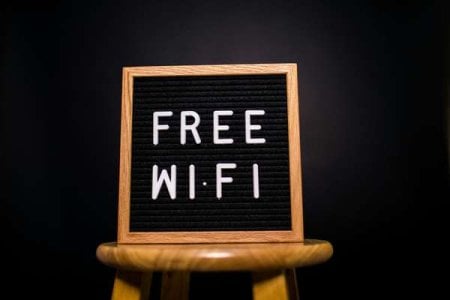Australians Beware: The Hidden Dangers of Public Wi-Fi You Need to Know About Right Now!
By
Danielle F.
- Replies 6
In today's digital age, the convenience of staying connected is often just a Wi-Fi connection away. Public Wi-Fi, available in cafes, airports, and even on flights, is a boon for those of us who like to check emails, update our loved ones, or just scroll through the news while sipping a latte or waiting for a boarding call. However, as members of the Seniors Discount Club, it's crucial to be aware of the hidden dangers that lurk behind these seemingly harmless free Wi-Fi networks.
The recent case of Michael Clapsis, a 42-year-old from Western Australia, serves as a stark reminder of the risks associated with public Wi-Fi. Clapsis is accused of creating a fake Wi-Fi network, an 'evil twin,' on a flight to Perth, duping passengers into connecting to it instead of the legitimate inflight service. This nefarious act was allegedly done using a portable wireless access device hidden in his luggage. Unsuspecting users were led to a fraudulent webpage where they were prompted to enter personal details, which could then be exploited to access sensitive information such as bank accounts or private communications.

This incident is not an isolated one, and it highlights a broader issue that affects all of us, especially those who may not be as tech-savvy. Technology analyst Leigh Stark warns that it's 'next to impossible' to distinguish between safe and unsafe Wi-Fi networks at first glance. The ease with which a malicious individual can set up a rogue network is alarming, and the consequences of connecting to such a network can be severe.
For seniors, who may be using company phones or devices, the stakes are even higher. Connecting to a compromised network could potentially give hackers access to entire corporate systems, leading to data breaches that affect not just the individual but entire organizations.
Furthermore, always ensure that your devices are up to date with the latest security patches and antivirus software. Be wary of Wi-Fi networks that don't require a password, and always verify the network name with staff at the establishment before connecting. It's also wise to turn off file sharing and to select the option 'public network' when connecting to Wi-Fi outside your home, as this will provide an additional layer of security.

At the Seniors Discount Club, we understand the importance of staying connected with ease and safety. We encourage our members to share their experiences and tips on how they stay secure online. Have you ever encountered a suspicious Wi-Fi network? Do you have any personal strategies for keeping your data safe while using public Wi-Fi? Join the conversation in the comments below and help us build a community that's savvy and secure in the digital world.
The recent case of Michael Clapsis, a 42-year-old from Western Australia, serves as a stark reminder of the risks associated with public Wi-Fi. Clapsis is accused of creating a fake Wi-Fi network, an 'evil twin,' on a flight to Perth, duping passengers into connecting to it instead of the legitimate inflight service. This nefarious act was allegedly done using a portable wireless access device hidden in his luggage. Unsuspecting users were led to a fraudulent webpage where they were prompted to enter personal details, which could then be exploited to access sensitive information such as bank accounts or private communications.

Several public Wi-Fi networks could be a fake network that could steal your information. Image Credit: Pexels/RDNE Stock Project
For seniors, who may be using company phones or devices, the stakes are even higher. Connecting to a compromised network could potentially give hackers access to entire corporate systems, leading to data breaches that affect not just the individual but entire organizations.
So, what can you do to protect yourself? The first line of defense is caution. Avoid using public Wi-Fi for sensitive activities such as online banking or shopping where personal information and credit card details are exchanged. If you must use public Wi-Fi, consider investing in a Virtual Private Network (VPN). A VPN encrypts your data, making it much harder for anyone else on the network to intercept and misuse your personal information.Furthermore, always ensure that your devices are up to date with the latest security patches and antivirus software. Be wary of Wi-Fi networks that don't require a password, and always verify the network name with staff at the establishment before connecting. It's also wise to turn off file sharing and to select the option 'public network' when connecting to Wi-Fi outside your home, as this will provide an additional layer of security.
Key Takeaways
- Michael Clapsis is accused of creating a fake 'evil twin' Wi-Fi network to steal personal details from passengers on a flight to Perth.
- Police allege the fake Wi-Fi network could capture personal data, potentially giving access to victims' bank details or communications.
- Clapsis has been charged with nine cybercrime offences and his case was adjourned for a future court date.
- Technology analyst Leigh Stark advises avoiding public Wi-Fi where possible and using a VPN for added security if necessary.







